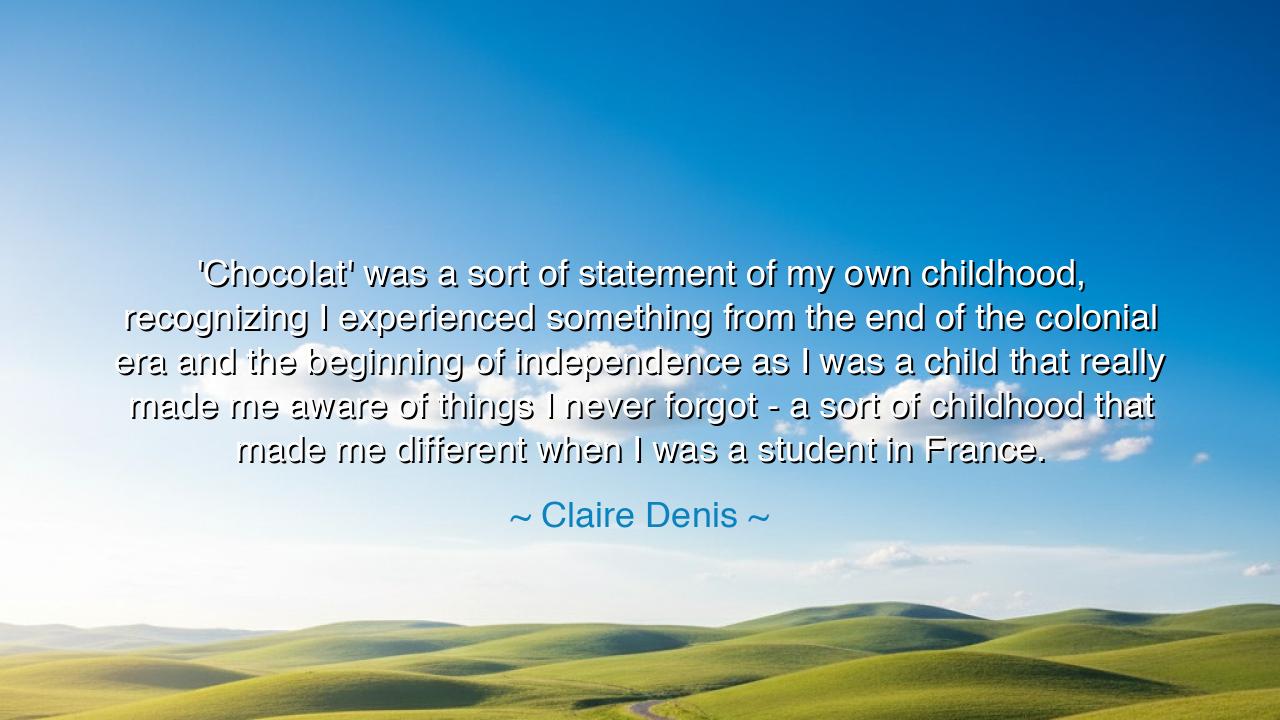
'Chocolat' was a sort of statement of my own childhood
'Chocolat' was a sort of statement of my own childhood, recognizing I experienced something from the end of the colonial era and the beginning of independence as I was a child that really made me aware of things I never forgot - a sort of childhood that made me different when I was a student in France.






“‘Chocolat’ was a sort of statement of my own childhood, recognizing I experienced something from the end of the colonial era and the beginning of independence as I was a child that really made me aware of things I never forgot — a sort of childhood that made me different when I was a student in France.” Thus spoke Claire Denis, the French filmmaker whose art is a bridge between worlds — between colonialism and independence, between memory and awakening, between belonging and estrangement. Her words are not merely about a film, but about the formation of a soul caught in the great turning of history. In them we hear both the ache of remembrance and the wisdom of one who has lived between two suns — one setting, one rising.
The film “Chocolat”, released in 1988, was Denis’s first major work, yet it carries the depth of a lifetime. Set in Cameroon, where she spent her early years as the daughter of a French official, it tells the story of a young girl growing up in the waning days of the French Empire in Africa. Through the eyes of a child, Denis witnesses the invisible wall between colonizer and colonized — a wall built not of stone, but of custom, silence, and power. The child in her learns that beauty can exist beside injustice, that affection can be laced with guilt, and that love itself can carry the burden of history. Thus, when she speaks of her childhood at the end of the colonial era, she speaks of awakening — of the moment when innocence first encounters the sorrow of human division.
In those tender years, Denis was not merely living her childhood — she was absorbing the world’s contradictions. She saw the quiet dignity of African families, the uneasy grace of French settlers, and the vast African landscape that held both harmony and hurt. As independence dawned, she saw that a world she had known — one ruled by hierarchy and distance — was collapsing, giving birth to something uncertain yet necessary. This duality — the end of empire and the beginning of self-rule — became the lens through which she would forever see humanity. She did not forget, for such lessons, once learned, leave their mark upon the spirit.
When she later became a student in France, Denis realized how different she was from her peers. While they spoke of identity in theory, she had lived its fractures in the heat and dust of a changing Africa. The distance between her childhood and theirs mirrored the distance between worlds. She carried within her the memory of both colonizer and colonized — a memory that made her an outsider in both realms. Yet from that difference, she drew her art, her empathy, her understanding that truth lies not in the comfort of one side, but in the tension between many.
Her story mirrors the tale of countless children born at the crossroads of empires — those who grow up witnessing the twilight of one age and the dawn of another. Consider George Orwell, who as a boy in British India saw firsthand the contradictions of power and conscience. Like Denis, he too would later translate that awareness into art, crafting works that laid bare the moral weight of empire. Both artists remind us that childhood, when lived amid transformation, can awaken a lifelong search for justice and meaning. The colonial era may end with treaties and flags, but in the hearts of those who lived it, it echoes for generations.
Through her art, Denis sought to reconcile these echoes — to speak truthfully of the complexities of affection, guilt, and belonging. In “Chocolat”, she does not condemn, nor does she glorify; she observes. Her film, like her memory, is filled with quiet pain and gentle revelation. It asks us to see the invisible — the unspoken divisions that shape who we are. For this is the mark of the artist who remembers: she transforms history into reflection, and reflection into healing.
So let this teaching be carried forward: the past, no matter how painful, must be faced, not buried. Those who have lived between two worlds are not cursed, but chosen — chosen to bear witness, to bridge divides, and to remind others that independence is not only the freedom of nations, but the liberation of understanding. As Denis’s childhood made her different, so too can our own experiences of difference make us wiser.
Therefore, remember this lesson: to be aware is to be alive. Let your memories — even those of pain or confusion — become your teachers. Seek truth in the spaces between, and do not fear the complexity of your own story. For in understanding where we come from, and in recognizing the humanity of those once separated from us, we take part in the eternal work of independence — the freeing of the human heart from ignorance and division, toward empathy, awareness, and peace.






AAdministratorAdministrator
Welcome, honored guests. Please leave a comment, we will respond soon